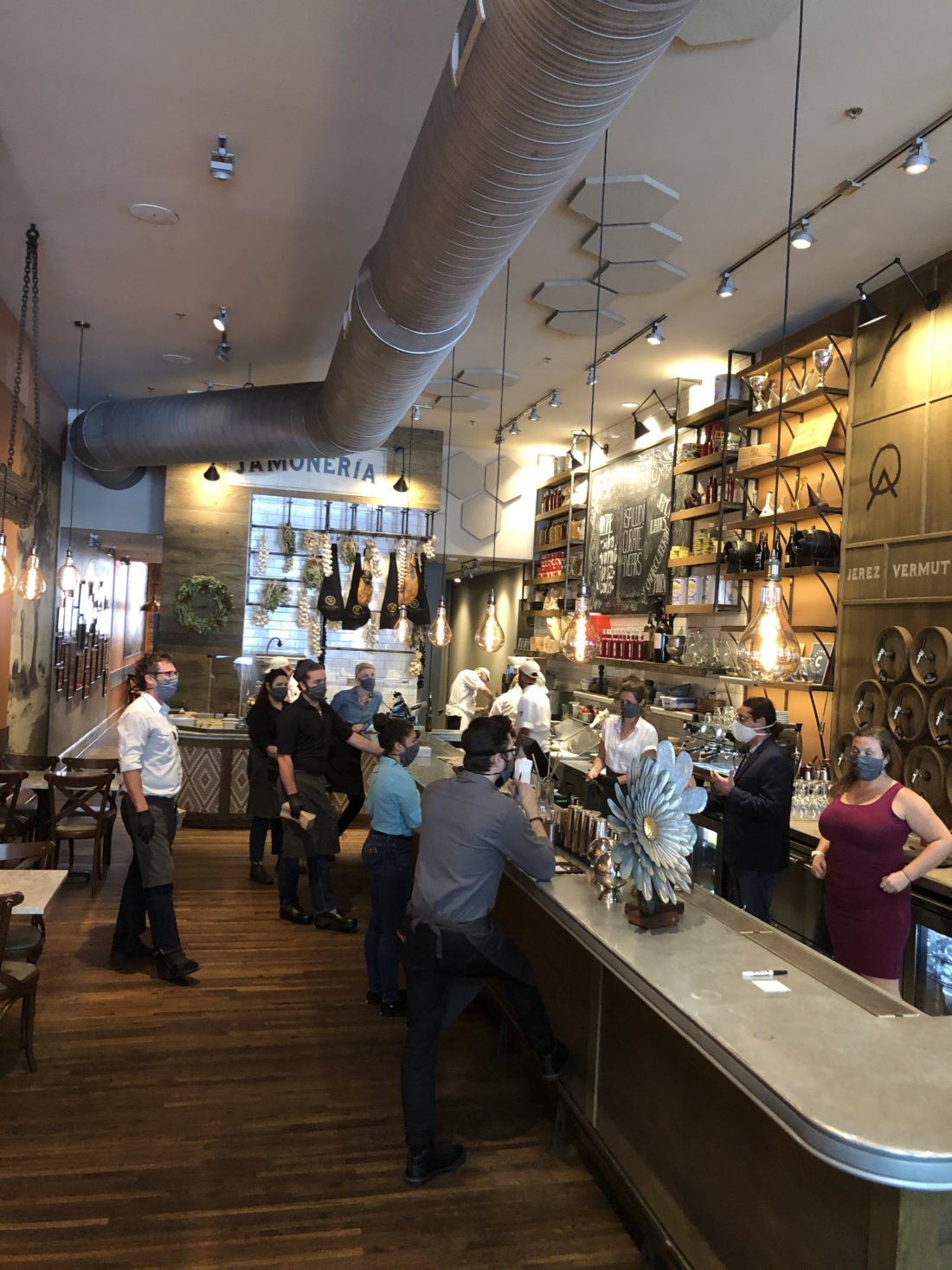The scale of the Paycheck Protection Program — a $669 billion pot of funding for forgivable loans to businesses and nonprofits established as part of the federal government’s coronavirus aid package — is matched by the size of the spreadsheet detailing its recipients. At over 661,000 rows and 131 megabytes, opening the document noticeably strains a reporter’s computer.
But unwieldy as it may be, the July 6 data set provides the first real transparency into one of the largest relief efforts of the COVID-19 era. The file lists names, locations and award amounts for all companies and nonprofits that received PPP loans of more than $150,000, along with how many jobs those loans were projected to retain.
Perhaps unsurprisingly, many of those who sought and received aid in Buncombe County were tied to the tourism industry. Restaurants, brewers, hoteliers, tour companies and retailers were all among the 449 named PPP beneficiaries with headquarters in Asheville.
Subsequent to qualifying for their PPP loans, at least 46 of those entities also received help from the Buncombe County Tourism Development Authority. Together, those businesses and nonprofits took home more than $1.12 million in grants from the TDA’s Tourism Jobs Recovery Fund, a $5 million effort supported by occupancy tax revenue that previously had been dedicated to tourism product development.
Was that extra local help necessary, given the millions in federal money that the businesses and nonprofits had already received? Ask Randy Talley, owner of Asheville-based restaurant chain Green Sage Cafe, and the answer is an emphatic yes.
“We feel extremely fortunate to have received every single loan that we applied for, but we think it’ll take everything that we have received and then some to get to a time in the future where we will be profitable again,” Talley says.
Imperfect fit
Sage Ecoenterprises, the parent company of three Green Sage locations, received a PPP loan in the $150,000-$350,000 range on April 8. (Federal data discloses loan values in categories, not as specific amounts.) At that point, Talley says, his restaurants were closed in compliance with Gov. Roy Cooper’s executive order to slow the spread of coronavirus, and the vast majority of his employees were laid off. But federal regulations required him to spend at least 75% of the money on payroll within eight weeks for the loan to be forgiven.
Despite the risk of not meeting that goal, and thus being saddled with substantial debt from the unforgiven loan, Talley put off rehiring his employees until Cooper had signaled restaurants could reopen for in-person dining in late May. Otherwise, he says he would’ve been paying staff to sit at home while Green Sage was not legally allowed to seat customers.
“For anybody who was going to operate through this, it was probably a windfall: extra, extra, extra money. But for me, it was more like survival money,” Talley argues. “I didn’t want the money to be just a substitute for unemployment; I wanted it to give us a fighting chance to live another day.”
Congress eventually amended the PPP’s parameters on June 5, giving businesses longer to spend their loans and increasing the amount that could be put toward rent and utilities. But COVID-19 had introduced new expenses for Green Sage to operate safely, such as personal protective equipment and plastic register shields, that the PPP would not cover.
An $18,000 grant from the TDA, Talley says, allowed him to meet those needs, as well as invest in to-go ware for his restaurants’ newly expanded takeout business. With both customers and employees able to operate safely, he says, sales have recovered to about half of their pre-pandemic levels — enough to buy time, he stresses, but not yet enough to make money.
Katie Button, owner of Cúrate Tapas Bar and Button & Co. Bagels in Asheville, agrees that the PPP wasn’t sufficient to save her businesses. None of the more than $1.1 million loan her restaurant group received, she explained, could be used to pay outstanding invoices to local farmers and restock her kitchens.
“I just kept telling them, ‘As soon as we get funding, I will pay you back.’ But as soon as we got the PPP money, I couldn’t pay them back, because it’s illegal to use those funds for that purpose,” Button recalls.
TDA grants totaling $42,000 between Button’s two restaurants had no such limitations, helping her make those suppliers whole. “We saw that TDA fund, and we thought: ‘If we get this, I can pay that farmer who I can’t look in the eye because I’m embarrassed I haven’t paid them yet,’” she says.
Complementary efforts

That flexibility was a key goal of the Tourism Jobs Recovery Fund, says Noah Wilson, director of sector development for nonprofit Mountain BizWorks. The TDA paid his organization $150,000 to administer the fund and evaluate grant applications.
“PPP is incredibly important to keep people in our community on payroll and keep business’s rents and utilities paid,” Wilson explains. “But a great deal of need exists for programs like the [Tourism Jobs Recovery Fund] that can help them adapt and cover the many other costs needed to safely and successfully reopen.”
Wilson says that TJRF applicants had to disclose other emergency funding they’d received, including PPP loans, as part of their grant documents. That funding wasn’t directly tied to grant approval, he continues, but helped Mountain BizWorks understand how tourism-related entities would finance their reopening.
“The businesses and nonprofits that got significant PPP awards are also, by the very nature of the PPP program, going to be some of the tourism sector’s biggest employers,” Wilson says. “We were able to leverage those federal funds, make the most of our government’s investment in those firms, and pay for things that the PPP can’t in order to give them the best possible chance at success.”
David Whitehill, executive director of the Asheville Symphony, says that’s how his nonprofit is combining PPP and TDA money. A federal loan of $197,000, he says, allowed the symphony to pay its musicians and staff during a critical period of planning and fundraising. A $17,670 TDA grant will help it welcome patrons back when in-person concerts resume, currently scheduled for February 2021.
In the meantime, Whitehill says, the symphony is exploring options for pop-up outdoor concerts and other ways to be present in the community. “There’s a lot of ways we’re all going to need to heal through this, and one of the ways to heal is through music,” he adds.
Editor’s note: Green Line Media, the parent company of Mountain Xpress, received a Paycheck Protection Program loan of $150,000-$350,000 on April 13. Because Xpress does not provide a “direct in-person tourism experience,” the publication was ineligible for TDA support.



Everyone can see that tourism related business have been hurt hard. But…
What about the many many non-tourism related businesses that received PPP loans. Listed in that data base are companies such as large law firms, like McGuire Wood & Bissett, which received $1-2million, one of many law firms to receive tax payer, forgivable loans. Why did so many law firms, who have the ability to generate bill able hours working remotely need a bailout.
What about Fred Anderson Toyota? Why did a local car dealership need the a $5-10million bailout?
What about Hunter Subaru? They also got a huge freebie, at $2-5million.
AVL Technologies, a communications manufacturer got $2-5million of tax payer money.
And Skyland Distributing. With the huge demand with skyrocketing sales at grocery stores for drinks, apparently couldn’t pivot to a new business model without a $2-5million dollar bailout.
How did the shutdown hurt Southern Concrete Materials Inc enough to warrant $2-5million of tax payer money?
Dave Steel got $2-5million.
When you start to look at this bailout, it is pretty obvious why the Federal Gov was so reluctant to release this information. Will the Mountain Xpress ask so tough questions about why these huge quantities of tax payer funds where requested by these local businesses?
All of these loans will be forgiven by doing nothing less than spending the money on payroll, allowing them to hoard in the bank the funds they should have spent on payroll.
When will all these companies thank the American Citizens for this free money?
In regards to Katie Button’s comment that the PPP loan cannot be used to pay local farmers and is illegal; a complete false statement. Yes, the money can be used to pay suppliers albeit that portion will not be forgiven but the loan rate is only that of 1%. This is troubling that business owners are looking to spread the pain instead of paying their suppliers for supplies and services already rendered.